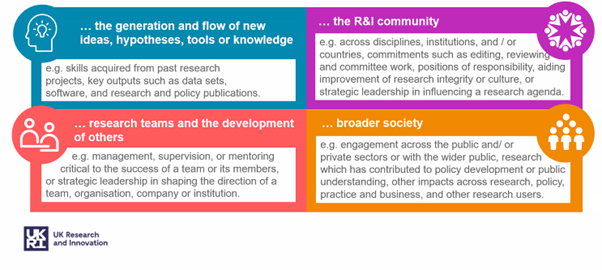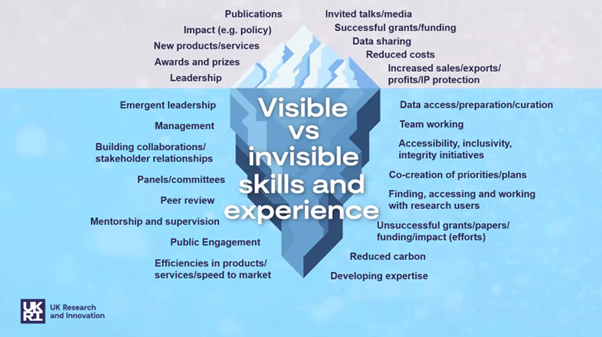As part of efforts to improve research culture, many research organisations and funders are committed to reforming research assessment. Part of this is no longer using journal-based metrics to evaluate publications and broadening the understanding of the outputs, skills and experiences that are valued in research.
What is a narrative CV?
Whilst different funders will use their own templates, a narrative CV is essentially a CV format in an application that prompts written descriptions of contributions and achievements that reflect a broad range of skills and experiences. This is a change from metrics-based CVs that are primarily publication lists with employment and education history with little context.
UKRI, the parent organisation of the UK Research Councils, has defined four core modules of their narrative CV model and are piloting it in funds across the Councils. Applications to UKRI funds that use the Résumé for Research & Innovation (R4RI) CV model might be asked to demonstrate experience or skills relating to any of the modules or themes below.

Is there any advice for writing a narrative CV?
- Every statement you make should be supported by evidence – this evidence will be exemplified in the application guidance but can include papers, datasets, conference presentations, posters, collaborations established, software developed and more.
- Use active words (led, managed, characterised, developed) and own your achievements – when talking about different projects and achievements make sure your role is very clear.
- Use detail to describe roles and skills, even those that might seem less immediately connected to the creation of research. UKRI have identified ‘invisible’ skills and experiences that are just as relevant to the research process as the more ‘visible’ ones and all would be welcome to be included in a narrative CV response.

What about demonstrating my publications and citations?
Many of the organisations adopting this model are committed to not using journal-based metrics in assessment and the narrative CV style will not ask for publication lists.
Applicants may choose to include publications in their written responses, but you should focus on articulating the process and impact of the research. Do not rely on journal names, Journal Impact Factors or other metrics like the h-index to indicate the quality of the research. If the funder is a signatory of DORA, then the application guidance may prohibit including journal Impact Factors or their reviewers will be instructed to disregard them.
Funders including Swiss National Science Foundation and Luxembourg National Research Foundation have indicated that applicants will be able to include their ORCID for the panel to consult if they wish to. Maintaining an updated ORCID is important for this. Register for an ORCID and update it with your bio and works. Imperial staff may particularly benefit from synchronising their ORCID with Symplectic- this will mean you can control the publications that appear in both Symplectic and ORCID with a single administration.
How do I get help to write a narrative CV?
Always refer to the application guidance for the specific fund you are applying to.
The University of Glasgow has created a short (25 min) online course to support researchers making a narrative CV format application.
If you are a final year PhD student or a staff member applying for a fellowship you can also attend the Early Career Research Institute (ECRI) training workshop of Fellowship CVs and book a one-to-one session to have your application reviewed.
Attend a Using Publication Metrics Responsibly course where you will learn about the limitations of traditional metrics and how research organisations and funders are experimenting with new models research assessment. ECRI students can book via Inkpath or all other staff are welcome to attend by emailing Yusuf Ozkan y.ozkan@imperial.ac.uk to register interest for the next session.
If English is not your first language you can also get the support of the Centre for Academic English.
Where can I find information about Imperial's research culture?
Imperial is committed to a supportive, inclusive and ambitious research culture and you can find more about Imperial’s Research Strategy on the Research Culture Webpages.
The Imperial Open Research page will lead you to information on:
You might find useful information about research engagement with broader society at the Engagement and Enterprise teams.
What funds and funders are already or will soon be using a narrative CV model?
- BBSRC Tools and Resources Development Fund
- UKRI Citizen Science
- MRC Clinical Academic Research Partnerships
- UKRI Innovation Scholars: Data Science Training in Health and Bioscience
- EPSRC Postdoctoral and Open fellowships
- BBSRC Bioinformatics and Biological Resources Fund and Discovery Fellowships
As well as UKRI other funders that have already or are intending to adopt a narrative CV model include Alzheimer’s Research, British Heart Foundation, Cancer Research UK, Dutch Research Council, Health Research Board, Leverhulme Trust, Luxembourg National Research Fund, Medical Research Foundation, NIHR, Royal Academy of Engineering, Science Foundation Ireland, Swiss National Science Foundation, Wellcome and Wellcome Sanger Institute.